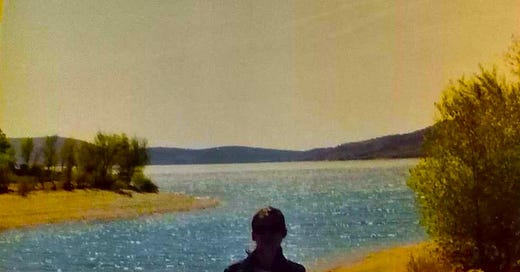The Tenderness of Wild Beasts, Second Chapter
Welcome to Lucero, a seemingly peaceful small town of California, which happens to be the scene of many dark events.
This is the second chapter of my novel, The Tenderness of Wild Beasts. It is a conversation. Between a daughter and her biological father. Between two people searching for the serial killer who has turned their lives and the lives of their loved ones upside down. Between two writers trying to find the words to exorcise themselves and reconnect. Their story begins in a fictional Californian town, Lucero, with the disappearance of two children during a wedding party. Who knows where it will lead them.
The Tenderness of Wild Beasts
Photo & Text all rights reserved © Saint-Lazare, 2025.
Chapter 2 - There is a Town
You never lived there, and I am pretty sure that you never truly noticed the town. Of course, you have crossed it with the 101 several times, on your way to the Bay Area and back to Los Angeles via Lompoc. You could even have used the gas station next to the truck stop, located just opposite my house –the peeling house. But even your inquisitive eyes could not have seen beyond the insignificant alignment of boring lots. A bunch of houses peeling under the Californian sun.
You never saw me.
And I have never seen you.
How ironic.
At first sight, Lucero is just a typical small town in the south of Monterey County. However, it is not only my hometown, it is also the theater of many events that have shaped my life; events that now require me to tell you my side of the story.
From the window of my bedroom, I remember seeing the vineyards and further away, the steep and dry paths that were disappearing at the top of the canyons into the green mass of the sequoias and other trees. I watched many wildfires from there, hypnotized by the flames and the whirling dark smoke that seemed at the same time dangerously close and almost oneiric. A tall wall of naked concrete was separating the house from a car repair shop and from the U.S. route, supposedly to soften the noise. Yet, the constant sound of the traffic and the roar of the engines my neighbours were working on resonated in the background of my young thoughts for years –and sometimes, they still do.
The lot where my two-story house was built, sometime before my birth, was part of one of the most recent portions of the new Lucero and there still were sandlots here and there. The town’s biggest wasteland was the one on which the Elementary School was built in the eighties. Its then avant-garde architecture played with volumes, with variations of shapes, heights, and holes. It gave it the look of an industrial hacienda, in weird salmon tones. A castle in the desert.
I loved going to the first-floor balcony to knock the blackboard’s brushes, just to stare at the rough emptiness in front of me. The schoolyard was, for kids, incredibly vast, with contrasting parts of sand, dried grass, and asphalt.
The only other trace of humanity that populated the grand desertic lot was the new sheriff’s office. After I moved to Boston, they built houses, a mall, and the motel in which we are right now.
From the balcony of my house, I was able to see the old Lucero, on my right, next to the bizarre tower of the city hall. In my childhood memories, I always pictured that part of the town as a parade of narrow and gloomy streets. If not for the movie theater, I would never have ventured there, even older. And for Mum’s bookstore, of course. Both were quite cosy. The first time I went to the theater, it was with school, to see Home Alone. I instantly felt at ease in this dark atmosphere, in the ocean of blue, fluffy seats and shared laughs of so many invisible friends. As surprising as it sounds, I was more social back then. But I was already a loner and Mum’s bookstore was perfect for this way of life, with many nooks to hide and look at books in secret. Yet, I ventured into these places under adult’s supervision only.
The surroundings of the wine bottling plant were much more synonymous with freedom to me. On the balcony, on my left, I could easily spot the distant, grey mass of the wine plant, just at the bottom of the State Park, with the infinite dusty roads crossing the green vineyards and the tormented cypress trees standing in front of the evening sky. At dusk, I often went there with my bike, and I would let the warm wind ruffle my hair. These memories are associated with the sweet smell of fresh figs I used to steal there and the pleasure of loneliness. Those were precious moments as, after Jayce Dugard’s kidnapping, parents were more reluctant to have us beyond their sight.
Nobody likes missing kids.
Nobody likes pretending to hope to find them, several years after, prisoners of perverts.
Nobody would admit that they would prefer them dead.
Perhaps this was the reason why the missing flyer’s smile was intact, because the souls of Lucero would rather see Fiona and Nathan Garrison dead than missing. I don’t understand why it would be so inhuman.
Of course, I hated the plant, even before that specific night. Its unpleasant aura had a lot to do with Oliver. It was the reason why we lived in Lucero, where those events happened to me. One could say my childhood was pretty happy, and, in a way, it was, but there always has been something fake, deficient, out of place. Lucero was no Ludlow or Derry; we had fast trucks but no pet cemetery –just the normal one that you will visit soon. We had missing kids but no evil clown in the sewers. My childhood was not a dark cliché; still, either something was genuinely coming for me or, as Oliver later said, I was the one looking for it.
But I don’t want him to be the first person I tell you about. First, because I don’t care about him.
Then, mostly, because the story I am telling you has to start with Judith, as it ends with her.
(To be continued).
Want to read more from this serialised novel? Here’s the Content Directory:






I see how much Lucero itself is a character. The peeling house, the suffocating small-town silence, the way memories settle like dust over everything—it’s all so vivid. That line about people preferring missing kids dead rather than lost? Chilling. And the way you weave nostalgia with unease, childhood innocence with something darker… it’s unsettling in the best way. I feel like I’m standing on the edge of something just waiting to swallow me whole. I wish there were a notification to let me know when chapter 3 will be posted... But yes, I will be waiting.
The description of Lucero really puts us right there, creating that eerie and somewhat lonely atmosphere. I felt the "you" was isolated, even though the narrator interacted with 'me' through the fourth wall, which worked well for me.
And of course "Nobody would admit that they would prefer them dead." is a killer line.
Now, I want to know all about Judith.